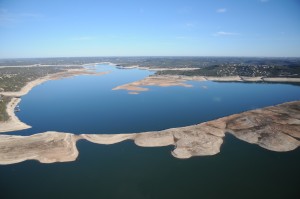TCEQ rejects LCRA Water Plan, Suggests Fewer Downsteam Releases

Photo by LCRA
The extreme drought and 2011 releases to farmers lowered levels in Lakes Buchanan and Travis (pictured) in Central Texas.
Citing the current drought, the Texas Commission on Environmental Quality (TCEQ) rejected the Lower Colorado River Authority’s (LCRA) most recent amendment to its water plan.
TCEQ’s decision, announced in a letter from Executive Director Richard Hyde to the LCRA on Friday, comes as the latest unprecedented move in the agency’s attempts to combat persisting drought conditions. At the center of these measures are restrictions on water releases for agriculture downstream of the Highland Lakes chain, mostly to rice farmers, and Hyde suggested that the LCRA’s proposed plan doesn’t appropriately address these releases.
“As the TCEQ worked through this amendment and also received input on the emergency relief requested by LCRA in the last year, it became apparent that even since the time that application was submitted, additional data and changes to the Water Management Plan were warranted,” Hyde wrote.
LCRA originally submitted the amendment in March of 2012, after a year and a half of work among stakeholders, and the continuation of extreme drought since has placed increasing pressure on the Highland Lakes chain, and in turn, the rice farmers that depend on annual releases from the LCRA’s dams. But, for the last three years, the TCEQ has approved emergency water cutoffs to those farmers.
A draft report for the amendment, which the TCEQ sent back to the LCRA, has far more strict guidelines for water cutoff limits and minimum storage levels for the Highland Lakes.
“TCEQ is proposing a very comprehensive drought management regime which includes more stringent curtailment curves with a higher limit on when interruptible water releases would be completely curtailed, depending on the severity of drought conditions,” Hyde wrote.
The draft report proposes three new categories, situations labeled “extraordinary drought,” “less severe drought,” and “normal conditions,” under which to consider curtailing releases. The report includes the latest stream flow data, but only gives a range for what storage levels in the Highland Lakes should be under normal conditions. Hyde said he anticipates a fixed number in the revised amendment.
According to the LCRA, it expects to need two to three months to conduct a “thorough analysis” of the TCEQ’s recommendations.
“Because the TCEQ’s proposed revisions to the plan appear complex and highly technical, it is essential that LCRA carefully assess the potential impacts on the lower Colorado River basin,” Bill Lauderback, LCRA executive vice president for Public Affairs, said in a statement.
TCEQ last approved an amendment to the LCRA’s Water Management Plan in 2010, though it has been successfully amended several times since it went into effect in 1989.

